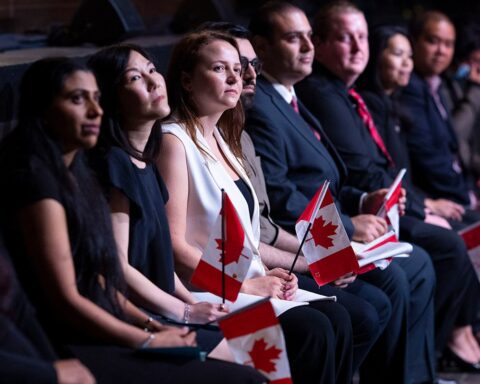In one sense, the Liberal majority in the House is good for the Conservatives. It puts them in a position where they needn’t be in any rush to launch a leadership campaign and convention.
No one sees a convention before the spring of 2017, and there’s every reason to consider putting it off until the fall of next year, mid-mandate for the Trudeau government. Unless the Fixed Elections Act is amended, we know now when the next election will be held — on the third Monday in October four years from the previous election. That would be October 20, 2019.
Two years is all the time a new opposition leader needs to establish his or her presence in the House, recruit new candidates, fill the party coffers and hit the hustings.
The money factor is also an argument for delaying a leadership convention. Individual donations are limited by law to $1,500 a year, and by putting the convention off to next year, candidates would be able to raise twice as much money by announcing in the second half of 2016.
The Conservatives have the opportunity to refurbish their brand.
In the meantime, the Conservatives have the opportunity to refurbish their brand, in the Commons and in the country. This starts with putting Stephen Harper in the past, where he belongs. But Conservatives can’t really do that while he’s still sitting in the House.
He needs to leave town, and soon. When it’s over, it’s over. And it’s definitely over for Harper, even — and perhaps especially — within the ranks of Conservative MPs, who have been liberated by the departure of the Harper gang. They’re even having fun. Imagine that. And the interim leader, Rona Ambrose, has set a refreshing and exemplary change of tone.
Reflecting on what went wrong
Then there’s the policy convention set for Vancouver at the end of May, which will allow the Conservatives to complete the election post-mortem. That shouldn’t take long. They ran a lousy campaign and deserved to lose. Exhibit A: the barbaric practices snitch line, the precise moment when moderate Conservatives gave up and crossed over to the Liberals.
It’s clear that in 2015, most Canadians living in cities didn’t recognize themselves, or their aspirations, in the Conservative party.
Conservatives must ask themselves how they can make their party relevant again in Canada’s major cities, where they were clobbered in October. The Greater Toronto Area is the prime example. Where the Conservatives held nine out of 23 downtown 416 seats in the last Parliament, they went zero for 25 in the new House. And where the Tories owned suburban 905 in the last House, with 21 out 22 seats, they were knocked back to only a handful out of 29 in the new one.
Maybe closing Harper’s GTA campaign with the Ford brothers wasn’t such a good idea.
The Conservatives also won zero seats in downtown Vancouver and on the Island of Montreal. It was the same in Ottawa and every city to the East Coast, excepting only Quebec City. Calgary and Edmonton — Conservative heartland — were the only cities in the West won by the Conservatives.
It’s clear that in 2015, most Canadians living in cities didn’t recognize themselves, or their aspirations, in the Conservative party. That should be an important part of policy development, and clearly needs to be addressed in the leadership campaign.
So who’s going to jump in when the race does begin?
Well, Tony Clement for one. He can’t win — but he probably can’t be talked out of it, either.
Maxime Bernier, for another. He can’t win, either. But he represents the economic-libertarian wing of the party, and in the Quebec wing of the party, he would begin as a native son.
Kellie Leitch probably can’t be talked out of running. She was working the room hard last November at the Albany Club’s Sir John A. Macdonald dinner at the Royal York ballroom in Toronto. She is one of the smartest people in any room — but she made a major error in agreeing to front the snitch-line announcement, and she’ll have to get past that.
[T]here’s been very little talk about or support for a Kenney candidacy in the Conservative caucus.
Michelle Rempel, only 36 at her birthday next month, is probably too young, but that may not stop her from running.
Then there’s Jason Kenney, whose candidacy once was regarded as inevitable. In government, he was in charge of the party’s outreach to multicultural communities, and he built his own network among them. But there’s been very little talk about or support for a Kenney candidacy in the Conservative caucus. It may be that he can be kingmaker, but not king.
Lisa Raitt is whip-smart and, as transport minister in the Conservative government, was among the strongest members of Harper’s last cabinet. A Cape Breton girl turned suburban Toronto hockey mom, she would be a strong candidate. At 47, she represents generational change, with a strong profile in the GTA. But she would need to work on her French.
Outside the caucus, the name of Saskatchewan Premier Brad Wall keeps coming up. But he has an election this spring and doesn’t speak French, either. Kevin O’Leary? Please. This is a leadership race, not a reality show.
Finally, there’s Peter MacKay, who probably leads the prospective field in name recognition. He definitely would be the favourite son of Atlantic Canada, and would be the clear choice of the Progressive Conservative wing of the united-right party he co-founded with Harper in 2003. And he’s still only 50.
But MacKay is at a different place in life right now — married to human rights activist Nazanin Afshin-Jam, with two young children at home. As a former justice minister he can practise law in any province, and as a former foreign minister and defence minister, he has a network in G7, G20 and NATO countries. Any big Toronto law firm would be lucky to get him.
The thing is, he hasn’t ruled out a return to politics yet. Unless and until he does, his name will be on the list.
L. Ian MacDonald is editor of Policy, the bi-monthly magazine of Canadian politics and public policy. He is the author of five books. He served as chief speechwriter to Prime Minister Brian Mulroney from 1985-88, and later as head of the public affairs division of the Canadian Embassy in Washington from 1992-94.
Re-published in partnership with iPolitics.ca.





